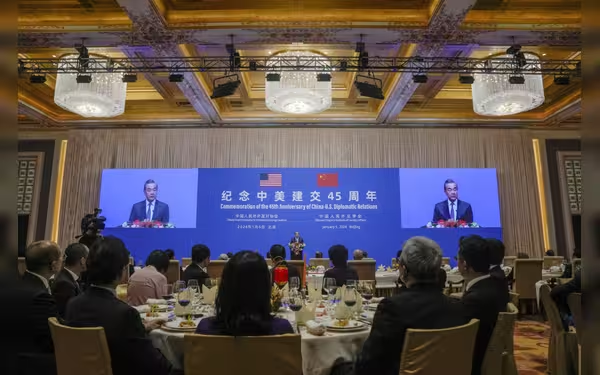Saturday, November 16, 2024 07:57 PM
China Emerges as Top Challenge for US Diplomacy
- China poses unprecedented challenge to US history.
- Biden administration urges allies to confront Beijing.
- US concerns over China's technology exports to Russia.
 Image Credits: arabnewspk
Image Credits: arabnewspkSenior US diplomat Kurt Campbell states China is the greatest challenge in US history, urging allies to adopt a tougher stance.
In recent discussions, a senior US diplomat has emphasized that China poses the most significant challenge to the United States in its entire history, even more so than during the Cold War. This assertion was made by Deputy Secretary of State Kurt Campbell, who has been instrumental in shifting US foreign policy focus towards Asia over the past 15 years. Campbell's remarks come at a time when the Biden administration is urging European allies to adopt a tougher stance against Beijing.
During a session with the House Foreign Affairs Committee, Campbell stated, "There is a recognition that this is the most significant challenge in our history." He elaborated that the challenges posed by China are not limited to military concerns but extend across various sectors, including technology and global relations. He stressed the need for the United States to enhance its capabilities to effectively compete with China.
The Biden administration has been vocal about its concerns regarding China's technology exports to Russia, which US officials claim have bolstered Moscow's military efforts in Ukraine. Campbell pointed out the necessity for increased support for US sanctions on Chinese companies, particularly during his visits to Europe, where he has found that many allies share similar concerns about China's relationship with Russia.
However, Campbell acknowledged that European nations are still grappling with the repercussions of drastically reducing energy imports from Russia following its invasion of Ukraine. He noted, "For many of these countries, doing business with China has been a big deal for 15 or 20 years," indicating the complexity of the situation.
China has countered these claims by asserting that it is not supplying weapons to either Russia or Ukraine, although the US maintains that Beijing is providing support with military applications. Despite the ongoing tensions, there have been efforts to ease relations between the two superpowers, particularly following a summit last year between President Biden and President Xi Jinping.
In a notable development, China recently released an American pastor, David Lin, who had been detained since 2006. This move was confirmed by the State Department, which has been actively raising the cases of Lin and other detained Americans with Chinese officials. The situation remains delicate, as the State Department also considers two other US citizens, Kai Li and Mark Swidan, to be wrongfully detained in China.
Swidan's mother has publicly urged President Biden to engage with China regarding her son's case, highlighting the emotional toll such detentions take on families. Peter Humphrey, a former detainee in China, has shed light on the harsh realities faced by many Americans imprisoned there, describing his experience as "torture designed to crush the human spirit and force out a confession."
As the US navigates its complex relationship with China, it is clear that the stakes are high. The ongoing dialogue and diplomatic efforts are crucial not only for addressing immediate concerns but also for shaping the future of international relations. Understanding the multifaceted nature of this challenge is essential for both policymakers and the public, as the implications of these developments will resonate far beyond the borders of the United States and China.













